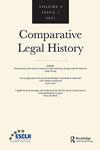The School of Salamanca. A case of global knowledge production
IF 0.5
Q2 LAW
引用次数: 0
Abstract
employ. Boucoyannis’ case studies are drawn from England, France, Castile, Catalonia, Hungary, Flanders, Italy, the Ottoman Empire, and Russia. She offers brief consideration of ‘additional cases’ drawn from Holland, Poland, Sweden, Denmark, Swiss Cantons, and the Holy Roman Empire (25). Boucoyannis notes that organic arrangements in these cases frequently reflect opportunism at work. In the author’s words: ‘bargaining on taxes was equally common across regions’ (7). What matters–in her final assessment–is ‘power properly deployed’, that is, power deployed to justify the power to deploy power (318). This suggests that, over time, kings learned a great deal as judges. A national court system is a suitable place to acquire and refine the statecraft needed to innovate the state and extend its useful life. It is not a lesson confined to Westminster Hall.萨拉曼卡学校。一个关于全球知识生产的案例
雇佣。Boucoyannis的案例研究来自英国、法国、卡斯蒂利亚、加泰罗尼亚、匈牙利、佛兰德斯、意大利、奥斯曼帝国和俄罗斯。她简要介绍了来自荷兰、波兰、瑞典、丹麦、瑞士各州和神圣罗马帝国的“其他案例”(25)。布科扬尼斯指出,在这些情况下,有机安排往往反映了工作中的机会主义。用作者的话说:“在税收上讨价还价在各个地区同样普遍”(7)。在她的最终评估中,重要的是“权力的适当部署”,也就是说,权力的部署是为了证明部署权力的权力是正当的(318)。这表明,随着时间的推移,国王作为法官学到了很多东西。国家法院系统是获得和完善治国之道的合适场所,而治国之道是创新国家和延长其使用寿命所必需的。这一教训并不局限于威斯敏斯特厅。
本文章由计算机程序翻译,如有差异,请以英文原文为准。
求助全文
约1分钟内获得全文
求助全文
来源期刊
CiteScore
1.70
自引率
0.00%
发文量
20
期刊介绍:
Comparative Legal History is an international and comparative review of law and history. Articles will explore both ''internal'' legal history (doctrinal and disciplinary developments in the law) and ''external'' legal history (legal ideas and institutions in wider contexts). Rooted in the complexity of the various Western legal traditions worldwide, the journal will also investigate other laws and customs from around the globe. Comparisons may be either temporal or geographical and both legal and other law-like normative traditions will be considered. Scholarship on comparative and trans-national historiography, including trans-disciplinary approaches, is particularly welcome.

 求助内容:
求助内容: 应助结果提醒方式:
应助结果提醒方式:


